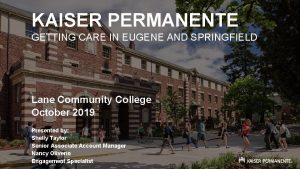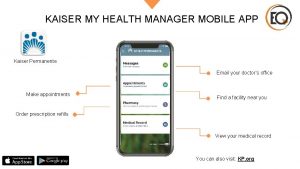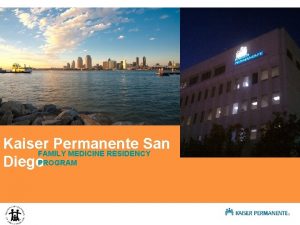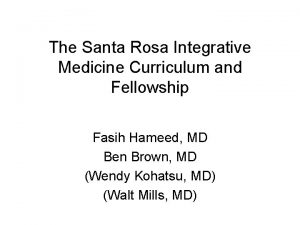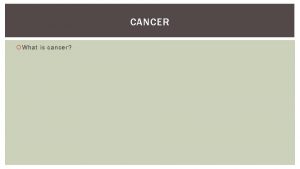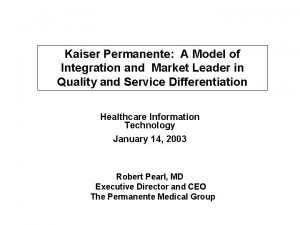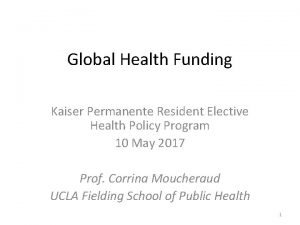KAISER PERMANENTE ANNUAL CANCER REPORT 2017 SANTA ROSA

















- Slides: 17

KAISER PERMANENTE ANNUAL CANCER REPORT 2017 SANTA ROSA MEDICAL CENTER THE PERMANENTE MEDICAL GROUP CANCER COMMITTEE DECEMBER 2017 1

2 OUR MISSION IS SIMPLE: Support our specialists in providing the best in personalized cancer care. Kaiser Permanente’s integrated health care system brings together a team of specialized physicians and cutting-edge technology to provide each patient with the best in personalized cancer care.

Cancer Care Achievements Integrated Approach to Cancer Care……. . 5 Commission on Cancer Accreditation …. . . 7 OUR COMMITMENT to Patients Cancer care touches our lives both professionally and personally. It is a top priority at Kaiser Permanente. All of our physicians work on cancer in one way or another—whether to prevent it, detect it early, treat it when we find it, care for the Kaiser Permanente’s Cancer Research Paves the Way for Improved Outcomes…. . 9 Trends in Cancer Diagnosis……………. . 10 Appendix…………………. . 12 survivors, or comfort those who may pass away as a result of the disease. We’ve made huge strides and continue to challenge ourselves through our commitment to every patient. OUR WORLD-CLASS Cancer Care Team Includes: • Experienced specialists who treat high volumes of patients • Seamless and timely care coordination • Support at every step of care: risk reduction, screening, diagnosis, treatment, and survivorship • Cutting-edge technology • Patient-centered care Our specialists work collaboratively to ensure world-class cancer care treatment and outcomes for every patient, by leveraging our expertise, investing in cutting- edge technology, and pushing the boundaries of what’s possible. 3

4 Cancer Care Achievements Cancer care is complex. We simplify screening, diagnosing, and treating patients with cancer through our integrated approach to care.

INTEGRATED Approach to Cancer Care As one of the largest integrated health care systems in the United States, we can quickly adapt to advances in treatment. We bring those benefits to our patients every day to perform thousands of treatments each year. At the same time, we create truly transformational innovations. Both rapidly adapting and developing new advancements is only possible by leveraging our specialists’ knowledge from many disciplines and medical centers linked together by our electronic health record system. We continuously weave advancements in equipment Our integrative approach to care also allows us to and techniques with each patient’s medical history, apply the most effective screening protocols to save preferences, and unique needs. This means we more lives, such as using universal reflex genetic can automatically review incidental findings, such testing for Lynch Syndrome of all newly diagnosed as a thoracic imaging study that can be reviewed colorectal cancer patients. by various experts. This process facilitates rapid Our multispecialty physician team will: and consistent follow-up on unexpected cancer discoveries at imaging. • Recommend multiple ways to provide patient- centered care Our expert care team will work together to: • Bring cutting-edge treatment to patients • Review newly flagged cases This multidisciplinary approach is distinctive of our • Meet with each patient to discuss next steps, treatment options, and personalized care recommendations medical group and doesn’t exist in the fragmented fee-for-service health care sector. We’re able to standardize the best possible care, giving our patients It is the same as getting a second, third, and fourth their best chance to beat cancer. opinion at the start of the process. 5

6 CANCER CARE represents a large portion of our work at Kaiser Permanente. Only heart disease affects more people than cancer in the United States, and the number of cancer cases is quickly growing to surpass heart disease soon. We have an opportunity that other health care systems may not—to change that trajectory. The Commission on Cancer provides a foundation to focus on key quality care standards and our cancer program can lead this change.

COMMISSION on Cancer Accreditation There are more than 1, 500 Commission on Cancer (Co. C) accredited cancer programs in the United States, representing only 30 percent of all hospitals and treating more than 70 percent of all cancer patients. All Kaiser Permanente Northern California facilities are accredited or pursuing accreditation. To earn this prestigious accreditation, a cancer program must meet or exceed 34 quality care standards, be evaluated every 3 years, and maintain levels of excellence in the delivery of comprehensive patient-centered care. When cancer patients seek care at new treatments, genetic counseling, a Co. C-accredited cancer center, and patient-centered services, they gain access to comprehensive, including psychosocial support, state-of-the-art cancer care close patient navigation, and a survivorship to home. Kaiser Permanente takes care plan. We improve our patients’ this one step further. Our integrated quality of life—both before and after health care system allows for true cancer. These integrated partnerships multidisciplinary, end-to-end care, result in improved patient care. and treats cancer as a complex group of diseases treated by a team of specialists. Because of this approach, patients have access to clinical trials, 7

8 Clinical Trials Matter to Us We’re proud to offer cancer patients access to cutting-edge treatment through participation in clinical trials.

Kaiser Permanente’s Cancer Research Paves the Way for Improved Outcomes We’re recognized for participating in numerous clinical trials with national and international research organizations. All of our medical and radiation oncologists are investigators on our cancer research team. There are more than 70 clinical trials available to patients at any given time. Because of this, we offer patients access to cutting-edge treatment options and research in symptom management, screening, and prevention. In 2014, Kaiser Permanente was awarded The new funding will allow Kaiser Permanente a 5 -year grant of 10. 4 million dollars from to expand its focus on research into care the National Cancer Institute (NCI) to delivery by: conduct cancer clinical trials and cancer • Evaluating alternative treatment delivery systems care delivery research studies. We joined 4 other Kaiser Permanente Regions to • Examining disease prevention form an NCI Community Oncology Research Program (NCORP). This new • Exploring pain and symptom management program represents 1 of every 40 patients • Investigating disparities in cancer outcomes and how to eliminate them in the United States and continues to bring cutting-edge treatment options to our patients while comparing existing cancer treatments on a patient-by-patient basis. 9

TRENDS in Cancer Diagnosis The cancer registry is an essential component of the Commission on Cancer (Co. C) accredited cancer program and an invaluable tool in the fight against cancer. Like all Co. C-accredited facilities, Kaiser Permanente maintains a cancer registry and contributes data to the National Cancer Database (NCDB). This nationwide oncology outcomes database is the largest clinical disease registry in the world. All types of cancer are tracked analyzed through the NCDB and used to explore trends in cancer care. Co. C-accredited cancer centers, in turn, have access to information derived from this type of data analysis, which is used to create national, regional, and state benchmark reports. Our cancer registry data aids in identifying trends, assists in program planning, and allows our continuous evaluation of cancer care. Specialists at this hospital interface with patients throughout our system. Our specialists’ experience within the system is summarized in Table 1. 10

Table 1. Kaiser Permanente, Northern California Region All Cancer Cases Diagnosed 2012– 16: All Behaviors, All Stages Leading Diagnoses by Year of Diagnosis (Ranked for 2016 Diagnoses) PRIMARY SITE OR TYPE 2012 2013 2014 2015 2016 Total BREAST MELANOMA PROSTATE LUNG/BRONCHUS COLORECTAL URINARY BLADDER NON-HOD LYMPHOMA CORPUS UTERI KIDNEY/RENAL PELVIS BRAIN/OTHER NERVOUS PANCREAS ORAL CAVITY/PHARYNX ALL LEUKEMIA THYROID LIVER/INT. BILE DUCT STOMACH OVARY MYELOMA SOFT TISSUE/HEART ESOPHAGUS ANUS/ANAL CANAL VULVA TESTIS HODGKIN LYMPHOMA OTHER ENDOCRINE CERVIX UTERI OTHER SKIN SMALL INTESTINE OTHER BILIARY LARYNX ILL-DEFINED ALL OTHERS 3, 745 1, 759 2, 608 1, 685 1, 530 791 743 696 585 661 486 445 483 415 307 258 293 250 136 168 150 151 94 73 160 96 79 74 62 77 658 401 3, 876 2, 023 2, 436 1, 749 1, 554 841 725 648 602 691 475 465 529 393 370 247 246 243 161 150 164 162 105 83 176 86 83 78 67 81 644 397 3, 748 2, 265 1, 415 1, 764 1, 677 865 850 758 579 740 502 508 528 411 446 296 300 257 148 165 180 169 120 116 156 93 97 82 74 70 568 418 3, 928 2, 475 1, 705 1, 778 1, 635 893 829 739 705 645 508 517 479 474 423 293 280 268 147 184 186 150 131 87 156 90 114 87 58 92 520 433 3, 794 2, 519 1, 712 1, 638 1, 619 893 830 802 701 563 496 485 481 437 346 304 262 236 164 163 162 139 119 107 102 96 89 79 75 430 424 19, 091 11, 041 9, 876 8, 614 8, 015 4, 283 3, 977 3, 643 3, 172 3, 300 2, 467 2, 420 2, 500 2, 130 1, 892 1, 398 1, 381 1, 254 756 830 842 771 569 468 755 467 469 410 340 395 2, 820 2, 073 TOTAL 20, 119 20, 550 20, 365 21, 009 20, 376 102, 419 SOURCE: Kaiser Permanente—Northern California Cancer Registry (09/14/2017) 11

Program GOALS In 2017, our Cancer Committee established two program goals for improving patient care. Clinical Goal: As a Kaiser Permanente pilot site, Santa Rosa Medical Center was charged with developing, testing, and implementing a new Patient Reporting Outcomes tool for Head/Neck cancer patients. The goal of the pilot is to design a suitable workflow that the Head/Neck care team can successfully implement to improve patient care and service, and potentially generate research opportunities. This will also allow physicians to better meet their patients’ needs, to identify ongoing issues that might otherwise be missed, and to ensure that patients know their doctors care about their overall quality of life. End of Year Results Our Head/Neck cancer patients now receive a baseline survey from the care team, and follow-up surveys are conducted throughout each patient’s care experience. Programmatic Goal: 1) Increase our Breast Cancer Support Group classes from once a month, to twice a month. 2) Increase cancer patient education materials from one to three guidebooks. End of Year Results 1) Breast Cancer Support Group classes are now held on the 2 nd and 4 th Monday every month. In addition, new outreach reminders are sent twice monthly through secure messaging, and new educational components have been integrated into the classes to include nutrition, mindful meditation, and alternative medicine. 2) Three published guidebooks have been completed, with input from our Cancer Patient Advisory Council. 12

In the COMMUNITY This year, in addition to our regular cancer prevention program, Kaiser Permanente Santa Rosa sought to address the prevalence of melanoma in our service area membership, and Sonoma County as a whole. Skin cancer prevention was the primary focus of our outreach efforts. We created an interactive skin-cancer prevention kit and display that highlights the importance of using sunscreen, as well as having overall skin cancer knowledge. We also taught children about skin cancer prevention, by having them make bracelets out of beads that change color based on the UV level outdoors. Throughout the year, our Santa Rosa Medical Center clinicians and staff provided preventive skin cancer education to more than 1, 428 adults and children at diverse community events, including: Little League Opening Day, the Guerneville Pride Parade, our Women’s Night Out series, and North Bay Discovery Day. In addition, our physicians completed 67 skin cancer screenings and made 17 follow-up appointments for further screening at this year’s Kaiser Permanente Family Wellness Festival. 13

When Patients ASK, We LISTEN During the first quarter of 2017, our medical center formed a Cancer Patient Advisory Council (CPAC), to capture the voice of the patient. The CPAC was formed in conjunction with our clinical team. Its mission is to provide excellent care that combines evidence-based medicine with the art of healing, to serve patients with utmost commitment, respect, and compassion, and nurture their hope, trust, and dignity. The council, which meets on campus once a month, is comprised of a diverse group Kaiser Permanente cancer patients who are either undergoing or have completed treatment. In 2017, the CPAC focused on survivorship, and patient access to post-treatment resources. This included publishing a resource guide to help cancer patients maintain and renew all aspects of their health—nutrition, exercise, work/life balance, psychosocial, and sexual health. 14

ABOVE and BEYOND: Patricia May, MD Dr. Patricia May has a passion for improving cancer care. While attending Chicago Medical School, the UC Irvine undergrad remembers feeling sad and helpless, watching her grandfather battle metastatic cancer. Subsequently choosing to become a surgeon, Dr. May completed her surgery residency training and Surgical Oncology Fellowship at Harbor-UCLA Medical Center. And today, this board-certified surgeon shares her passion for patientcentered, comprehensive cancer care with our dedicated, multidisciplinary team at Santa Rosa Medical Center. Her medical focus is on gastrointestinal cancers, skin cancers, and general surgery—but she is also board certified in Palliative Care. Dr. May has chaired our Cancer Committee for 2 years, leading Kaiser Permanente Santa Rosa’s efforts to receive Commission on Cancer accreditation. Since moving here 5 years ago, she has served with the Sonoma County Medical Association (SCMA), is now SCMA president-elect, and is also a delegate to the California Medical Association House of Delegates. Dr. May believes in working with the full community of Sonoma County physicians to improve the medical care landscape for all patients, not just Kaiser Permanente members.

CANCER Committee Members Santa Rosa Medical Center’s Cancer Committee is chaired by Patricia May, MD, with Radiation Oncologist Irwin Lee, MD, serving as cancer liaison physician, and Assistant Medical Group Administrator Courtney Galbraith as program administrator. Northern California Cancer Registry Quality Coordinator Michael Oehrli, a certified tumor registrar, provides ongoing consultation. Teresa Miller serves as the project manager and performance improvement consultant. Our multidisciplinary Cancer Committee meets regularly throughout the year. Represented departments include: Surgery, Oncology, Radiology, Pathology, Palliative Care, Psychosocial Services, Clinical Research, Community Outreach & Health Promotion, Program Administration, and Performance Improvement. 16

Some photos may include models and not actual patients. © 2016, TPMG, Inc. All rights reserved. Regional Health Education. 06579 (Revised 10/17) 17
 Kaiser permanente santa cruz
Kaiser permanente santa cruz Mdo kaiser
Mdo kaiser Santa apolonia santa rosa
Santa apolonia santa rosa Kaiser permanente springfield
Kaiser permanente springfield Kaiser permanente bridge program
Kaiser permanente bridge program Kaiser permanente vision statement
Kaiser permanente vision statement Kaiser permanente medical financial assistance
Kaiser permanente medical financial assistance Kaiser permanente service area map
Kaiser permanente service area map Kaiser permanente value compass
Kaiser permanente value compass Kaiser permanente mobile app
Kaiser permanente mobile app Kaiser permanente community health needs assessment
Kaiser permanente community health needs assessment Kaiser permanente san diego family medicine residency
Kaiser permanente san diego family medicine residency Kaiser permanente spokane walk in clinic
Kaiser permanente spokane walk in clinic Rosangela rosa da rosa
Rosangela rosa da rosa Integrative medical clinic santa rosa
Integrative medical clinic santa rosa Icbf santa rosa de cabal
Icbf santa rosa de cabal Domingo 30 de agosto santa rosa de lima
Domingo 30 de agosto santa rosa de lima Academia santa rosa
Academia santa rosa



